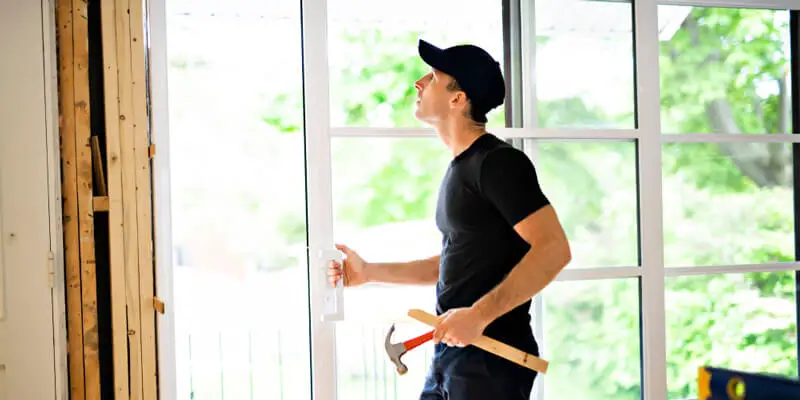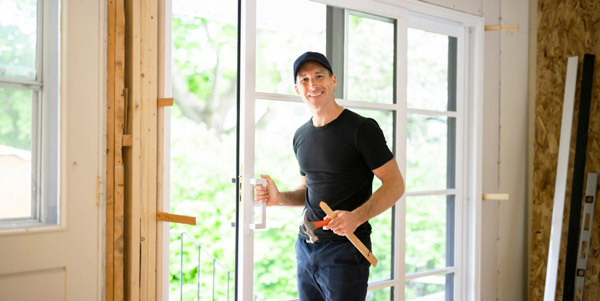A sliding glass door is an excellent choice for homeowners seeking an amazing contemporary style. Plus, this type of door offers an incredible view of your backyard or patio while allowing natural light to illuminate your living space.

Sadly, not all sliding glass doors are soundproof. They easily let in your neighbor’s annoying weekly mowing machine noise and loud conversations from passersby. It can be quite a disturbance and concern, considering strangers can eavesdrop on your in-home activities without trespassing.
But before spending another thousands of dollars replacing your sliding glass door with a new soundproofed one, here are some of the most practical DIY soundproofing tips to keep the noise at bay.
Is Soundproofing a Sliding Glass Door Really Possible?
Sliding glass doors are thin, which makes the idea of soundproofing them questionable.
Truth be told, it’s not possible to soundproof a door. Soundproofing and acoustic treatments are two words often used interchangeably. And they are pretty different.

Achieving a soundproof space involves more than a few tricks on the door. Usually, it has more to do with floating floors, decoupling walls, and employing several layers of acoustic treatment to make a room “truly” soundproof. This can be expensive but guarantees a whisper-quiet space.
On the other hand,
Acoustic treatment is ideal for absorbing and blocking noise invading your space. They are usually DIY projects costing less to get the noise level down to a bearable level. So, it’s not completely rid of unwanted sound but attenuating it for some peace and privacy. Also, it can be used to improve the acoustics of your room.
Why Soundproofing a Sliding Glass Door is Challenging?
This simple yet aesthetically pleasing sliding door is usually thinner than the standard hinged option because of its glass construction. The latter is often made of wood or other solid material that acts as a better obstacle to the path of noise. For glass doors, several layers of acoustic treatment are required to significantly stop the noise transmission.
Hinge doors are compatible with heavy treatments. You can apply heavier materials to increase the mass on the path of noise. With sliding glass doors, this cannot be possible without affecting its opening and closing mechanism. Besides, too many dense materials attached to the glass door might ruin its visual appeal.
Don’t fret! You can improve your sliding door’s soundproofing performance in clever ways without trading off its aesthetics or functionality.
Let’s dive into how to soundproof a sliding glass door correctly without further ado.
Practical Soundproofing Tips to Reduce Noise Going Through Your Sliding Glass Door
Seal the Gaps
When noise becomes an issue in your space, you can bet that the gaps around the door betray your sensitive eardrums. So, properly sealing all the cracks is central to reducing the noise invading your space. Even a pin-size hole can cause a lot of external noise to make it into your room.
Here are simple and inexpensive ways I found that completely seals out not only all the noise but also pest:
- Brush weatherstrips – Covering up all gaps on the side and top of the sliding door is easier with weatherstrips. It offers an air-tight seal to stop invaders – noise, natural light, and pests. It’s a perfect choice because of its flexible bristles that keep the weatherstrips in place regardless of how often you slide the door.
- Install a door sweep – While brush weatherstrips create an air-tight seal on the sides and top of the sliding door, door sweeps effectively cover up the gaps between the floor and the door. Thus further blocking outside noise from passing through any opening around the door for a quieter room.
- Acoustic caulk – After covering the gaps, check for small cracks between your wall and the door frame. If there are any, acoustical caulk will help cover them up completely.
Once you are done with these three essential soundproofing techniques, the result should be salient now. For homeowners who barely noticed any improvement, try other acoustic treatment options that involve using sound-blocking materials. I often don’t recommend them because it almost nullifies the appeal of a glass door.
Still, let’s go over them:
Acoustic/Soundproof Curtains
Soundproof curtains are made of super thick fabrics that help regulate sound and temperature. Soundproofing-wise, these dense fabrics won’t block the noise but absorb sound waves. Thus allowing noise intruding on your privacy to fade faster for a more comfortable space.
Talking of comfortable space, soundproof curtains are great black-out options that prevent natural lights and external temperature from affecting your home condition.
It’s essential to install the acoustic curtain properly to enjoy its sound and thermal insulation benefits. This means you must ensure the curtain covers the entire sliding glass door. Otherwise, light, heat, cold, and noise would still make it into your space.
When done correctly, soundproof curtains can maintain the serenity and temperature of the room. Thus improving the energy efficiency of your home for cheaper utility bills.
Sound-deadening blankets
For better noise reduction results, sound-deadening blankets score higher. While sound-deadening blankets and soundproof curtains involve hanging them behind your sliding glass door, the formal dampens noise incredibly better.
Made of fiberglass, sound-deadening blankets can stop airborne and structure-borne noise from passing through.
More importantly, these blankets come in different sizes, so you must carefully purchase one that covers the entire glass door for the best results.
Another thing that can affect the results is how you install them.
There are two ways to go about this:
The most common option is hanging the blankets on a curtain rod installed above the sliding glass door with the aid of grommets.
The second is my least favorite because it involves hooks and anchors to hang the sound-deadening blankets over the sliding glass door. It’s a quicker and cheaper method — no stress.
However, you must constantly remove the blankets to access the glass doors and its benefits. If this sounds like too much work for you, stick with the first installation option — it works for me.
There’s another reason some homeowners prefer the second installation method besides its fast and cost-effective benefits. Sound-deadening blankets are not visually appealing like soundproof curtains. Leaving them on your modern glass door might be against the overall appeal of your home.
Change the glass door (laminated, double, or triple)
After deploying all of the options mentioned above and the noise issue still persists, changing your sliding glass door is the last resort. It’s a big step, considering how much time and money it will cost you.
There are countless benefits to switching out the old glass door for a thicker or laminated one. They are explicitly designed to reduce sound waves traveling through them for a whisper-quiet space. And, of course, it means you don’t have to worry about covering your sliding glass door with blankets or curtains.
Indeed, it’s a costly project and might require you to shell out more than planned. Plus, you’ll have to hire a professional to help with the installation, which comes at an extra cost, except you can do this flawlessly.
Related FAQs
Yes. A thicker glass means more mass and obstacles for sound waves to struggle through. So, a triple-pane glass door will knock down the noise level lower than its double-pane counterpart.
Indeed, making your glass thicker is central to noticeable noise reduction. You can add glazing or plastic panels to either side of the glass for glass doors. While it might protect you from external noise, visibility is the trade-off.
Sound traveling through holes and cracks around the sliding glass door is responsible for the distracting whistling noise. The easiest way to solve this noise issue is to seal the holes. Check out how to fill gaps around the sliding glass door above.
As mentioned earlier, adding more material to the noise path helps achieve the serenity you’re seeking. Installing a second sliding glass door behind or in front of the existing one will provide additional protection for your home against external noise while also serving as an extra layer of security. This soundproofing technique is helpful for addressing both unwanted sound transmission and bothersome drafts.
Conclusion
Nothing beats a beautiful view and watching the sunrise from your bedroom. But when it also allows a cacophony of noise, you might regret going for a glass door over a solid one.
This dilemma often faced by homeowners with glass doors can be solved using effective acoustic treatments. Sealing the gaps and covering them up with sound-deadening blankets are the most effective soundproofing techniques to help regain your peace and quiet.
In most cases, these simple solutions reduce the noise, allowing you to sleep or focus better without interruptions. If not, you might have to replace the glass door with a new one — laminated, double or triple-paned glass door.
Related Resources:
